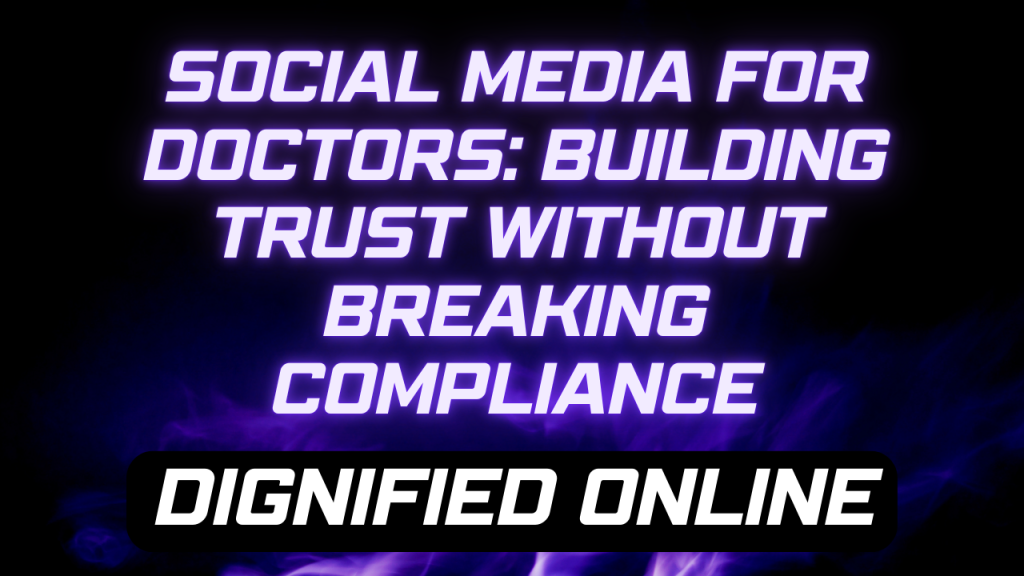In the digital age, a strong online presence is no longer optional—especially for healthcare providers. Patients turn to the internet not only to find doctors, but also to vet them. A well-managed social media profile can establish credibility, humanize physicians, and position them as thought leaders. However, for medical professionals, social media is a double-edged scalpel. One misstep can trigger serious legal consequences, especially when it comes to patient privacy laws like HIPAA.
That’s where strategic online reputation management becomes critical. Dignified Online, a firm specializing in reputation management for healthcare providers, helps doctors navigate the fine line between influence and compliance. With their expertise, physicians can amplify their voice without jeopardizing their license—or their integrity.
Why Social Media Matters for Doctors
Platforms like Instagram, LinkedIn, and X (formerly Twitter) are more than just networking tools—they are public stages. Medical professionals who use them wisely can build patient trust, correct misinformation, and even influence public health narratives. For example:
- Instagram is ideal for visual storytelling. Surgeons can showcase before-and-after photos (with consent), while pediatricians can share child-friendly health tips.
- LinkedIn allows for professional networking, sharing research, or announcing new practice offerings.
- X is great for real-time engagement, commenting on medical news, or participating in trending discussions.
Each platform has unique strengths—but they all demand cautious, ethical engagement.
The Risk of Oversharing: Where Compliance Comes In
The biggest compliance pitfall? Patient privacy.
The Health Insurance Portability and Accountability Act (HIPAA) strictly prohibits the disclosure of any identifiable patient information without consent. This includes photos, videos, names, medical records—even indirect identifiers like dates or unique case details. Violations can lead to steep fines, lawsuits, or board sanctions.
That’s why Dignified Online works closely with providers to audit their digital footprints and develop safe, strategic content plans. By understanding the nuances of HIPAA and digital communication, Dignified Online ensures that every post enhances a physician’s reputation without crossing legal lines.
What Compliance-Conscious Social Media Looks Like
Creating a compliant yet compelling social media presence is absolutely possible. Here are some core guidelines:
1. Never Post Without Consent
This sounds obvious, but it’s worth repeating. Written, documented patient consent is a must before sharing any photos, testimonials, or case studies. And even then, it’s best to err on the side of caution. Dignified Online offers templates and consent processes to simplify this task.
2. Focus on Education, Not Diagnosis
Avoid giving individualized medical advice online. Instead, use social media to share general health tips, answer frequently asked questions, or break down medical research into layman’s terms.
3. Maintain Professional Boundaries
Blurring the lines between personal and professional identities can dilute your credibility. Avoid posting polarizing opinions or unverified information. Dignified Online helps physicians craft content calendars that align with their brand values and ethical obligations.
4. Respond with Care
Patients may reach out via comments or DMs with medical questions. Resist the urge to engage in diagnostics. Instead, invite them to schedule an appointment or direct them to official communication channels.
Thought Leadership Without the Liability
The good news? When used correctly, social media can transform a medical professional into a thought leader. Providers can:
- Share their perspectives on public health issues
- Highlight practice achievements or certifications
- Collaborate with peers or contribute to medical dialogues
Dignified Online plays a key role in this transformation. Their team works behind the scenes to manage reviews, monitor online mentions, and keep social channels both compliant and engaging. They also train staff on best practices, ensuring everyone in the office knows the do’s and don’ts of digital conduct.
Final Thoughts: Trust is Built, Not Bought
Doctors are held to high ethical standards, both offline and online. In an era where misinformation spreads like wildfire and reputations are built with a click, social media can be a powerful tool—but only when used with care.
By partnering with healthcare reputation management experts, Dignified Online, healthcare providers don’t have to choose between visibility and responsibility. They can have both—building trust with their communities while maintaining the integrity that defines their profession.

